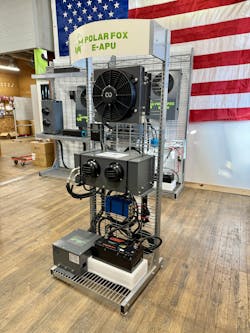Ohio truck shop's pivot to emissions work includes dual-purpose eAPU business
When Ryan Fox started Fox Truck & Tractor in Canton, Ohio, in 2021, his instinct was to be all things to all people. However, he soon recognized that the majority of his customers were truckers, and the majority of their problems tied to the aftertreatment system.
Ryan and his wife, Sophia, decided it would make more sense to narrow their focus. They rebranded as Diesel Emissions Specialists earlier this year, and also spun off a second e-commerce business, DPFdiscounter.com. He also changed his popular YouTube channel, Trucking and Fixing with Ryan, to Idle & Emissions Solutions.
But the Foxes’ business expansion hasn’t stopped there. Ryan and Sophia have recently taken steps to help relieve another one of their trucking customers’ biggest pain points. Auxiliary Power Units.
“Diesel APU maintenance is a big headache for many of our customers,” Sophia said. “Ryan always had it in his mind that many diesel APUs are overcomplicated. His initial vision was to buy the frames of APUs that weren’t working anymore, and add a more simplified refrigeration unit that would make things easier for our customers. But he just never had the time.”
Then a connection made through the YouTube channel led to a partnership with a Chinese manufacturer of a unique, “dual purpose” lithium-ion battery from Skana Power that’s ideal for an APU. This battery could not only run the APU, but start the truck as well.
The company sent Ryan a sample and later the company’s CEO paid a visit to Ryan and Sophia.
“She explained how they were the OEM supplier to top Chinese truck manufacturers for the past six years,” Sophia said. “So we knew they had a mature, proven product. They just needed a partner to help introduce it to the U.S. market.”
In a relatively short time after the rebrand, and a visit to the manufacturer in China, the Foxes gained 40% share of the sole Skana U.S. distributor and started up a new business called Polar Fox eAPU to provide U.S. customers with eAPUs using the dual-purpose tech.
According to their ROI calculator, a customer can make up the cost of the eAPU in about six months and then start realizing $9,400 or more annual savings.
Currently, installation can happen at the the Canton shop or a Dale's APU Sales in Lanoke, Arkansas, and Sprinfield, Missouri.
Read more: Aftertreatment exorcisms made easy
An eAPU battery that can also start a truck?
Yes, the Polar Fox eAPU, available in 12V and 24V models, is powered by what’s known as a “dual purpose” lithium battery. One purpose is to power the APU. But the primary purpose is to start the truck, which is where things start to get interesting.
A standard deep-cycle lithium battery doesn’t have the cold cranking amps (CCA) to start a truck. A lead acid AGM battery experiences more significant power drop, takes longer to charge, and generally requires an alternator upgrade and new wiring to provide the amperage needed to charge.
So how do they work?
First of all, lithium batteries in general hold power longer, charge faster, and last longer. In the case of Skana Power batteries specifically, a sophisticated BMS (battery management system) provides constant monitoring to ensure that enough stored energy will always be available for starting, while also providing protection against overcharging, overdischarging, short circuiting, and extreme temperatures of -40°F to 149°F.
For more details, Ryan goes into great detail on his YouTube channel.
The bottom line, Sophia said, is that dual-purpose lithium batteries allow fleets to streamline and simplify their sleeper trucks.
“The typical lead acid battery provides 900 to 1,000 CCA (cold cranking amps), so a sleeper needs four batteries to start the truck,” Sophia explained. “One of our dual-purpose lithium batteries provides 2,400 CCA, so you only need two for starting purposes. A fleet can replace their four existing lead acid starter batteries with four of these dual-purpose lithium batteries, and there is no need to add a second battery bank to power the APU.”
The impact on truck maintenance
Any electric APU has some advantages over a diesel-powered APU. The first ties to fuel consumption. Yes, a diesel-powered APU burns considerably less fuel than the truck engine. But it still burns fuel—generally about a gallon per hour, according to Sophia.
“Assuming $3.50 for diesel fuel and eight hours of APU operation per day, a fleet could save $28 a day in fuel cost,” Sophia explained.
With those fuel costs and daily usage, it would take 303 working days to show a positive ROI, Sophia said. But you also have to factor in the cost of oil and filters to maintain the diesel engine. That all goes away, too.
When comparing a dual-purpose lithium battery to traditional lead acid AGM and deep-cycle lithium batteries, Sophia said there are also maintenance advantages.
The traditional approaching of having two battery banks creates some challenges. First of all, when you’re mixing lithium batteries and lead acid batteries that both need to charge from the alternator, that alternator has to work overtime. Sophia said that can lead to reduced alternator life. Secondly, when lead acid batteries are in the starting bank and lithium batteries are in the APU bank, most fleets will install a battery charger in between to protect and separately charge the lithium batteries. “That’s just one more thing that needs to be installed,” Sophia said. “Plus, it creates another potential failure point in the system.”
As enticing as a dual-purpose lithium battery may sound, Sophia concedes that some fleets may have some reservations. The thought of streamlining a sleeper to just four dual-purpose batteries may appear risky. Lithium batteries may also cause some heartburn with fleets that are worried about reliability and safety. Sophia said all of those concerns are understandable, but not warranted given today’s advanced lithium-ion battery technology.
“These are high-quality batteries, and the advanced BMS includes numerous sensors and safety features,” Sophia said. “One thing fleets need to know is that, unlike lead acid batteries, these lithium batteries are operated by computer chips. So a fleet will need to know how to use the app to monitor battery system health. It’s not complicated, but a little training is necessary.”
Some fleets may also have concerns about supply chain reliability since the batteries are coming from overseas. “We have built up plenty of stock already,” Sophia said. “Also, the battery manufacturer has been growing and has a huge capacity of 3 million batteries per year. Yes, there will always be transit time and questions about tariffs. We’re actually having discussions about possibly bringing the final assembly process here to the U.S. at some point.”
In the meantime, Sophia and Ryan Fox are excited to help bring a solution to market that can help solve a big pain point for their customers: APU maintenance.
About the Author

Gregg Wartgow
Gregg Wartgow is a freelancer who Fleet Maintenance has relied upon for many years, writing about virtually any trucking topic. He lives in Brodhead, Wisconsin.

